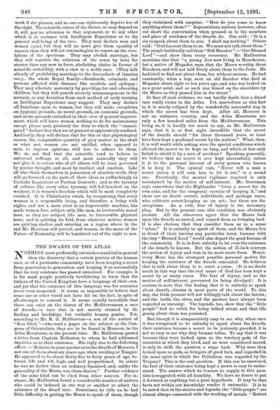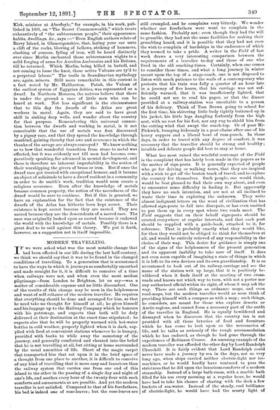THE DWARFS OF THE ATLAS.
NOTHING more profoundly astonishes mankind in general than the discovery that a certain portion of the human race, or of a particular community, have been keeping a secret from generation to generation, and keeping it so successfully that its very existence has passed unnoticed. For example, it is for most people positively bewildering to learn that the tinkers of the United Kingdom have a language of their own, and yet that the existence of this language was for centuries never even suspected. It seems so impossible to believe that some one or other would not have hit on the fact, in spite of all attempts to conceal it. It seems equally incredible that there can exist on the shores of the Mediterranean a race of dwarfs,—a race that is not merely stunted by ill- feeding and hardships, but veritable human ponies. Yet, according to Mr. R. G. Haliburton—a son of the author of "Sam Slick "—who read a paper on the subject at the Con- gress of Orientalists, they are to be found in Morocco, in the Atlas Mountains, at the present time. Mr. Haliburton quoted a letter from Captain Rolleston, to whom he had addressed inquiries as to their existence. His reply was to the following effect:—" Relative to your queries as to the dwarfs of Morocco, I saw one of them about six years ago, when residing at Tangier. He appeared to be about thirty-five to forty years of age, be- tween 3 ft. and 4 ft. high, and well proportioned. In colour he was no darker than an ordinary Spaniard, and, unlike the generality of the Moors, was clean-shaven." Further evidence of the same kind can be cited from other sources. For in- stance, Mr. Haliburton found a considerable number of natives who could be induced in one way or another to admit the existence of the dwarf race. Sometimes, he tells us, he had little difficulty in getting the Moors to speak of them, though
they exclaimed with surprise : "How do yon come to know anything about them P " Superstitions natives, however, often cut short the conversation when pressed as to the numbers and place of residence of the dwarfs, &c. One said : "It is a sin to speak about them to you. I shall say nothing." Others said : " God has sent them to us. We must not talk about them." The people habitually call them "Sidi Baraker"—" Our Blessed Lord "—and show them every reverence. Mr. Haliburton mentions also that "a young 'Jew now living in Manchester, but a native of Mogador, says that the Moors worship these Barakers, and will not talk freely about them to the Jews. He had tried to find out about them, but without success. He had constantly, when a boy, seen an old Baraker who died at Mogador about eight or ten years ago, and who was looked on as a great saint, and as such was kissed on the shoulders by the Moors as they passed him in the street."
In face of such evidence, we can hardly doubt that a dwarf race really exists in the Atlas. Yet, marvellous as this fact is, it is surely eclipsed by the wonderfully successful way in which the secret has been kept. After all, Morocco is not an unknown country, and the Atlas Mountains are only a few hundred miles from the Mediterranean. This being so, it is hardly too much to• say, as Mr. Haliburton says, that it is at first sight incredible that the secret of the dwarfs should "for three thousand years at least have been kept a profound secret by the, natives." What, then, it is well worth while asking, were the special conditions which allowed the secret to be kept so long, and which at last only failed to shield it by a sort of accident ? Speaking generally, we believe that no secret is ever kept successfully, unless it is to the personal interest of every person who knows it to keep it. The cynical rule, "Never tell a man a secret unless it will ruin him to let it out," is a sound one. Practically, the mental vigilance required is only maintained by the motive of self-interest. Mr. Stevenson says somewhere that the Highlander " loves a secret for its own sake, and for the congenial exercise of 'keeping it," and there are no doubt certain individuals, and perhaps races, who cultivate secret-keeping as an art;. but these are the exceptions. As a rule, fear of injury is the necessary plug. But in the present case this condition was obviously present. All the observers agree that the Moors' look upon the dwarfs as sacred, and regard them as bringing luck It is also obvious that they consider them as in a sense " taboo." It is unlucky to speak of them, and the Moors live in dread of their leaving any particular town, because with the tiny " Blessed Lord " would also depart the good fortune of the community. It is, in fact, unlucky to let even the existence of the dwarfs be known. But the notion of ill-luck conveys the notion of injury and ruin in its most acute form. 'Hence, every Moor has the strongest possible personal motive for keeping the existence of the dwarfs concealed. He believes that to talk about them is to court a curse. (It is no doubt much in this way that the real name of God has been kept a secret by so many races. The fear of injury, and so the motive of self-interest, prevented its being divulged.) It is curious to note that this feeling that it is unlucky to speak about dwarfs, obtains in most parts of the world. To this day, the Irish peasant will not willingly talk about the fairies ; and the trolls, the elves, and the gnomes have always been regarded as uncanny. The legends, too, show that the "little people" had no relish for being talked about, and that idle gossip about them was punished.
But though it is comparatively easy to see why, when once it was recognised to be unlucky to speak about the dwarfs, their existence became a secret to be jealously guarded, it is not so easy to see why they became taboo. To say that it was because they were looked upon as the tutelary gods of the countries in which they lived, and so were considered sacred, is only to shift the question a stage back. Why were they looked upon as gods, as bringers of good luck, and regarded in the same spirit in which the Palladium was regarded by the Trojans ? This is the real question. If this can be answered, the fact of their existence being kept a secret is easy to under- stand. The answer which we venture to supply to this ques- tion is suggested with all humility. We have no desire to put it forward as anything but a pure hypothesis. It may be that facts not within our knowledge render it untenable. It is to be noted that in the stories and legends, the " little people " are almost always connected with the working of metals. "Robert Kirk, minister at Aberfoyle," for example, in his work, pub- lished in 1691, on " The Secret Commonwealth," which treats exhaustively of "the subterranean people," their appearance, habits, dwellings, &c., says :—" Even English authors relate of Barry Island, in Glamorganshire, that, laying your ear unto a clift of the rocks, blowing of bellows, striking of hammers, clashing of armour, fyling of iron, will be heard distinctly ever since Merlin enchanted those subterranean wights to a 'solid forging of arms for Aurelius Ambrosius and his Britons, kill he returned. Which Merlin, being killed in batten, and mot coming to loose the knot, those active Vulcans are ty'd to a perpetual labour." The trolls in Scandinavian mythology are, again, miners. Still• more remarkable in this context is a fact noted by Mr. Haliburton. Patah, the Vulcan of the earliest system of Egyptian deities, was represented as a dwarf. In Northern Morocco, the natives believe that there is under the ground a race of little men who can be heard at work. Not less significant is the circumstance that to this day the dwarfs of the Atlas are great 'workers in metal. Again, they are said to have great skill in sinking deep wells, and wander about the country for that purpose. Remembering this universal connec- tion between the dwarfs and working in metal, is it not conceivable that the use of metals was first discovered by a pigmy race, and that they spread the knowledge through mankind, gaining thereby that awe and reverence in which the thanks of the savage are always conveyed ? We know nothing as to how that wonderful transition from stone to metal was -effected, but it was evidently not till men had become, com- paratively speaking, far advanced in mental development, and there is therefore no inherent improbability in the notion of their worshipping the givers of brass or iron. But if once the -dwarf race got treated with exceptional honour, and it became an object of solicitude to have a dwarf resident in a community in order to do smith's work, tradition would soon create a religious reverence. Even after the knowledge of metals became common property, the notion of the sacredness of the dwarf would be sure to continue. But if this is granted, we have an explanation for the fact that the existence of the dwarfs of the Atlas has hitherto been kept secret. Their -existence is kept secret because they are sacred. They are sacred because they are the descendants of a sacred race. The race was originally looked upon as sacred because it endowed -the world with the knowledge of metals. Possibly there is a great deal to be said against this theory. We put it forth, however, as a suggestion not in itself impossible.



































 Previous page
Previous page